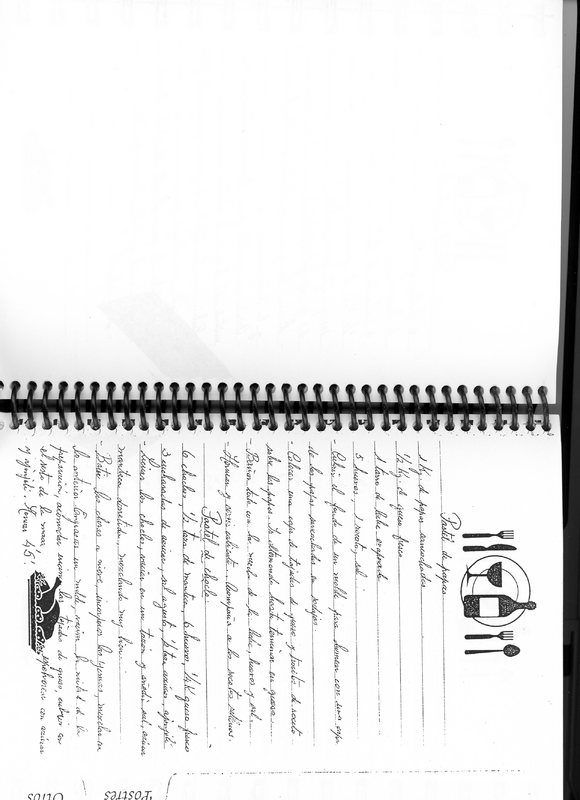"Mis Recetas" Recipe Book
Title
"Mis Recetas" Recipe Book
Subject
Peru
Peruvian Americans
Cooking, Peruvian
Cookbooks
Peru—Civilization— —Chinese influences
Peru—Civlization— —Italian influences
Peruvian Americans
Cooking, Peruvian
Cookbooks
Peru—Civilization— —Chinese influences
Peru—Civlization— —Italian influences
Description
Food is something that brings about pride in someone's culture or heritage, Moises Yllanes’ recipe book is his culture kept alive. The cookbook is more than 20 years old and is a collection from his aunt and family from Peru. While Moises is from Peru, his grandfather was born in Peru but of Chinese descent and his Grandmother was of Italian descent, making Moises cookbook that more interesting because of his diverse background.
Keeping that individual past alive is why food is so essential for immigrants like Moises according to Author of Latino Food Culture, Zilkia Janer, "Latino's resist homogenization and insist on keeping the distinctiveness of their culinary cultures alive." Food also helps with reconnecting generations, according to the book Edible Identities: Food as Cultural Heritage because it not only brings out identity but it, "binds people together, not only through space but time as well, as individuals collectively remember past experiences with certain meals and imagine their ancestors having similar experiences. When this occurs, food is transformed into heritage."
Moises’ perseverance to preserve this cookbook from his aunt and family shows how important it is for his Peruvian heritage. Once he moved to New Britain, he kept asking for the recipes from his aunt and eventually was able to save some of the meals he grew up having at dinner. The book gives future generations a step-by-step breakdown on how to cook multiple meals, everything from the temperature to cook the food to the amount of time a specific dish should take to prepare is included in this piece of family history. Keeping the recipes around makes sure that the relatives of Moises will not be lumped into one group which has helped change the U.S. Census.
The U.S. Census has changed the way they have labeled Hispanic or Latino dating back to 1930 when "Mexican" was included as an optional race to 2000 when there was a subgroup for Salvadoran or Dominican. Keeping recipe books and other pieces of family history alive helps break down clumping of Latinos and helps create subgroups. In more than 30 years more than one-third of the population will be "Latino" but hopefully with the preservation of cookbooks, instruments, and other stories from immigrants like Moises the subgroup box will include Peruvian in the Census and not just a general Latino box.
Keeping that individual past alive is why food is so essential for immigrants like Moises according to Author of Latino Food Culture, Zilkia Janer, "Latino's resist homogenization and insist on keeping the distinctiveness of their culinary cultures alive." Food also helps with reconnecting generations, according to the book Edible Identities: Food as Cultural Heritage because it not only brings out identity but it, "binds people together, not only through space but time as well, as individuals collectively remember past experiences with certain meals and imagine their ancestors having similar experiences. When this occurs, food is transformed into heritage."
Moises’ perseverance to preserve this cookbook from his aunt and family shows how important it is for his Peruvian heritage. Once he moved to New Britain, he kept asking for the recipes from his aunt and eventually was able to save some of the meals he grew up having at dinner. The book gives future generations a step-by-step breakdown on how to cook multiple meals, everything from the temperature to cook the food to the amount of time a specific dish should take to prepare is included in this piece of family history. Keeping the recipes around makes sure that the relatives of Moises will not be lumped into one group which has helped change the U.S. Census.
The U.S. Census has changed the way they have labeled Hispanic or Latino dating back to 1930 when "Mexican" was included as an optional race to 2000 when there was a subgroup for Salvadoran or Dominican. Keeping recipe books and other pieces of family history alive helps break down clumping of Latinos and helps create subgroups. In more than 30 years more than one-third of the population will be "Latino" but hopefully with the preservation of cookbooks, instruments, and other stories from immigrants like Moises the subgroup box will include Peruvian in the Census and not just a general Latino box.
Citations for Supplementary Sources and Context:
Arreola, D. Hispanic Spaces, Latino Places: Community and Cultural Diversity in Contemporary America. University of Texas Press, 2009.
Brulotte, Ronda L, Michael A. Di Giovine. Edible Identities: Food as Cultural Heritage. Routledge, 2016.
Janer, Zilkia. Latino Food Culture: Food Cultures in America. ABC-CLIO, 2008.
Mitchell, R. Pablo. Understanding Latino History: Excavating the Past, Examining the Present. Greenwood (December 11, 2017)
Opie, Frederick Douglass. “Eating, Dancing, and Courting in New York Black and Latino Relations, 1930 – 1970.” Journal of Social History. (2008) 42 (1): 79 – 109.
Ruiz, Vicki L and Virginia Sanchez Korrol. Latina Legacies. Oxford: Oxford University Press, 2005.
Entry Author: Jim McCann
Creator
Moises Yllanes and Friends
Source
Moises Yllanes
Publisher
Moises Yllanes
Date
Creation Date: circa 1988.
Accession Date: April 26, 2018.
Accession Date: April 26, 2018.
Contributor
Moises Yllanes
Rights
Copyright to this resource is held by Moises Yllanes and is provided here by CCSU for educational purposes only.
Relation
History Harvest 2018 Interview #3
Format
.JPG Image Files
Language
Spanish
Type
Text
Identifier
History Harvest 2018, Object #3 (formerly object #2).
Coverage
New Britain, CT; Connecticut; United States; Peru; Latin America; 1988; 1980s; 2018; 2010s; 20th century; 21st century.
Text
Recipes
Original Format
Printed Paper.
Collection
Citation
Moises Yllanes and Friends, “"Mis Recetas" Recipe Book,” Latino History Harvest, accessed July 26, 2024, https://library.ccsu.edu/latinohistoryharvest/items/show/36.
